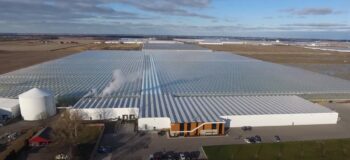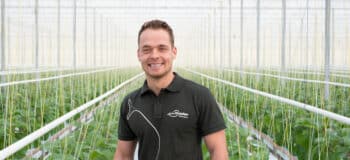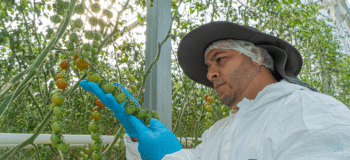More and more French greenhouse growers are researching new opportunities to decrease the water footprint of their operations. One of them is Michel le Duc, a French producer that cultivates greenhouse tomatoes in a high-tech greenhouse in Brittany. ‘I want to be able to grow the tomatoes of tomorrow while preserving the water resources that nature offers us.’
Reconsider water management
The longer, intense, and more frequent periods of drought during the summertime made grower Michel le Duc reconsider the water management on his farm. He saw the dependence on high-quality irrigation water for his crops increase. Since sustainable farm water management is also increasingly the topic of conversation among local policy makers, the grower started looking for water treatment solutions to make his business future-proof. Together with his local water-technical installer Premel Cabic, he researched a new solution to make optimal use of the available irrigation water and to recirculate irrigation streams as much as possible.
Safely re-use irrigation water
Because the cultivation of Michel le Duc takes place on substrate, most of the water flows are largely recirculated; the nursery applies a UV treatment to the drain water to keep the risk of diseases and pests to a minimum. In this way, the drain water, and the fertilizers it contains, can be reused, saving a lot of water and money. However, the reuse of drain water can lead to quality problems in the crop due to the increasing salt (sodium) content. When sodium levels in the recirculation stream reach critical levels, growers will normally flush away the drainwater and refresh this with new fresh water. Yet, due to increasing periods of draught and scarcity of high-quality fresh water, flushing away the water, and the costly fertilizers in it, is according to Michel le Duc no longer a sustainable option. Therefore, the grower decided to apply a new selective removal technique from Ridder which enables him to keep the buildup of sodium content under control and safely reuse even more drain water and fertilizers.
Zero-emission with Ridder NoNa+
Michel le Duc is one of the first growers to pioneer with the Ridder NoNa+ sodium removal system in France. The Ridder NoNa+ water treatment, that has been awarded with a Sival and GreenTech Innovation Award, uses a combination of a membrane with an electro-dialysis treatment to selectively remove the sodium from the drainwater. As the system only targets the sodium-ions for removal, all the other valuable contents of in the drainwater, such as fertilizers, are maintained and can be re-used in the cultivation system. With the Ridder NoNa+ growers like Michel le Duc are provided with a solution to increase drainwater recycling and minimize the water footprint. The solution is easy to integrate in existing situations and enables greenhouse growers to prepare their business for the future.
Future-proof
With the integration of a sodium-removal treatment in the water management system of the greenhouse company, Michel le Duc will be able to guarantee his customers with a continuous production of high-quality vegetables. Even in periods that his operation is subject to a long period of draught or water scarcity. In addition, the company anticipates future stricter laws and regulations, which aim to reduce the emission of residual water streams to the environment. But according to the grower, the overall resilience and a more sustainable production is key. ‘I want to be able to grow the tomatoes of tomorrow while preserving the water resources that nature offers us.’









